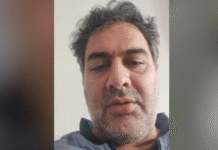A Kurdish asylum seeker from Turkey was discovered dead in the bathroom of a refugee detention center in Greece where he had been detained for the past 17 months, the Gazete Karinca news website reported.
The young man, İbrahim Ergün, 24, is thought to have committed suicide after Greek authorities ruled for the prolongation of his detention. Ergün’s body will be sent to his family in southeastern Mus province after an autopsy.
Ergün’s brother, Feyzi Ergün, said his brother had to flee Turkey due to increasing political pressure but was detained by Greek authorities at the port of Igoumenitsa in 2019 as he was trying to reach Italy. Ergün was taken to the Corinth pre-removal detention center.
The Corinth detention center was established in 2019 with the aim of functioning as a transit site for persons transferred from the islands and has since been accommodating asylum seekers exclusively in tents.
“My brother left to escape persecution but was eventually the victim of a different kind of persecution,” said Feyzi Ergün. “Greek authorities were responsible for his well being, but they kept on prolonging his detention. Is this the European Union? Is this democracy and human rights?”
Feyzi Ergün added that although authorities said his brother had committed suicide, they were waiting for the autopsy results to rule out any wrongdoing.
The Corinth pre-removal detention center is notorious for its dismal conditions. Refugees have described a very poor and unsafe reception situation. Moreover, due to the center’s distant location from hospitals and health facilities, most refugees have said they were unable to access health care.
Refugees protested against the poor conditions in October 2020, drawing attention to the poor quality of the food, lack of doctors on site, lack of access to education and poor housing. The Solidarity Initiative for Refugees of Corinth denounced the conditions in the camp and has tried to set up a support structure from the local society.
Some refugees have said their mental health was impacted by the living conditions in the center. They have said they felt abandoned, not well informed about legal procedures and their rights and opportunities and felt in danger.
The controversies surrounding refugee detentions have recently been discussed in the context of a migration deal between the European Union and Turkey.
On March 18, 2016 the European Council and Turkey reached an agreement aimed at stopping the flow of irregular migration via Turkey to Europe. According to the EU-Turkey statement, all new irregular migrants and asylum seekers arriving from Turkey in the Greek islands and whose applications for asylum had been declared inadmissible should be returned to Turkey. The EU pledged €3 billion in 2016-2017 and another €3 billion in 2018-2019 to Turkey as its part of the deal.
Following the agreement, Greece introduced policies forcing people entering through the islands to stay in camps there while they await a decision on their asylum claims.
Reception centers were established on Greek islands after the agreement, where asylum seekers were kept before their readmission to Turkey.
Last week civil society organizations called in a joint letter for an end to the containment and deterrence of asylum seekers at the EU’s external borders.
The letter harshly criticized the “EU-Turkey agreement,” saying it had opened the way for five years of human rights violations. It was signed by Amnesty International, Caritas Europa, the Danish Refugee Council, the Greek Council for Refugees, Human Rights Watch, the International Rescue Committee, Oxfam and Refugee Rights Europe.
The letter said asylum seekers should be treated with dignity and that the Charter of the Fundamental Rights should be respected by EU member states and that the fundamental rights of asylum seekers should be guaranteed.














